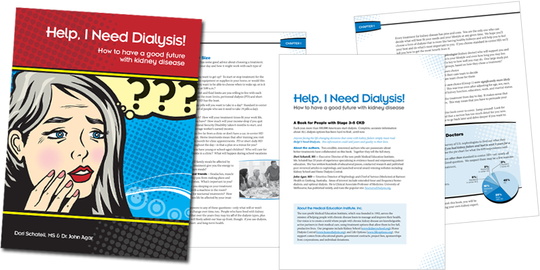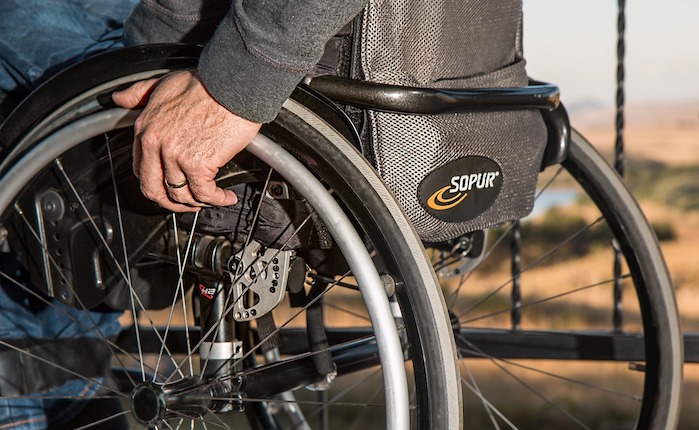Keeping Your Autonomy in the Hospital

For the past year I have spent more time in the hospital than outside of it. It has been a tough journey and it is not even over yet. My problems have not been directly dialysis or kidney related. But of kidney disease has played a large part in it in terms of physical resilience to infections. Around Christmas last year, I was asked by Dori if I could write a blog post about how I maintain my autonomy while inside these cold concrete walls. Optimistically I said, yes of course. No problem. Right? Well, given enough time it wasn't a problem. So here we go.
First you have to choose to be autonomous.
Are you up to it? I don't think it's a requirement for all to be autonomous. Personally I would rather jump out of a window than giving over the reins of my health to others. But I do respect those who choose to do so. So please don't read this as a crusade against anyone. On the contrary, I hope it can work as an inspiration for some. And remember, this is just my way of doing things—there are thousands of other ways to gain more control over your health.
Wisdom comes in many guises. One of my great sources of inspiration is Harry Potter:
"It is our choices, Harry, that show what we truly are, far more than our abilities."1

You have to make up with yourself whether choosing autonomy is worth it. What areas would you want to work on and what is your preferred end result?
It isn't easy to take matters into your own hands. Once you have made up your mind, the next step is to find out how much you want to decide for yourself. How big a bite of the autonomy apple are you willing and able to take?
There are many constraints.
There's the law. Many policies are written into different laws, be it local, state, national, or otherwise. Then there are local rules on all levels of administration. Hospital as well as ward or department administration. But many “rules” are more like customs. As with many other things, healthcare is steeped in conservatism. And, “that's the way we've always done it” seems to be the perfect excuse for breaking patients' autonomy almost anywhere I have encountered.
It is my experience that even when it comes to the laws and regulations that might seem to be set in stone, It is always a good idea to find out exactly what they say. Rules and laws are usually up for interpretation. And if you don't give yourself the chance to interpret them someone will do it for you—and most of the time it will be to their benefit, not yours.
Which brings me to the next point.
Educate yourself.

You cannot take control of your disease and your treatment in a knowledge vacuum. On the flipside, we cannot know everything. So, set a goal for what you need to know to take charge of your treatment.
For me, the first order of things is to know my vital statistics, including the important blood works. What are normal values? What are my particular values? What is “normal” for me over a period of time? Why do mine deviate from normal values?
The next thing is to know my medications including my vitamins and mineral supplements. 1½ years ago they imported an American computer system in my region here in Denmark. And since then my medication records have never been right. Never! Fortunately, both my doctors and nurses trust me when I tell them about the necessary changes. And even then, they end up being wrong then next time I look at them (typically at the beginning of my next hospitalization.)
After that there's a vast ocean of knowledge to dive into. A good place to start is by reading the great publication by Dori and Dr. Agar, "Help, I Need Dialysis!" Reading old blog posts here on the site as well as the threads in the discussion forums (try the search function for any particular subject)

I'm a nerd so I read scholarly articles—often to find what subjects are contentious so I'm prepared to take a discussion if anyone disagrees with me. But it's super nerdy and I will not necessarily recommend it to anyone else.
My point is you don't have to be so nerdy to take matters into your own hands. There is a lot of information out there. And many of us are willing to share what we know. Just remember, not all things you hear or read online—even from trusted “friends”—is necessarily good advice. We all have different circumstances. So, learn what yours are and use that as your guiding light.
"Never trust anything that can think for itself if you can’t see where it keeps its brain."2
Keep your personal dignity.
If there is anything I abhor, it's the sight of a man or a woman walking around the hallways in a hospital robe, head bent so the first thing you see is their knot of a bed head, a urine collection bag hanging from the belt of their robe, and socks almost falling off their feet as they drag across the floor. I always think to myself, “Who stole their dignity? They would never expose themselves like that in public. At least, I don't think so. I see nobody walking around the streets like that. And if I ever did, I would seriously consider calling the local psych ward to ask if an inmate was missing.
My first step in keeping my dignity is to dress as close to normal as possible. Casual, comfortable clothes that are easily donned and doffed. And, grooming. I can't stress it enough. It makes me feel so much better when my personal grooming is in order. I think if I was a girl it would include nails and make-up. I am lucky I just have to take care of my hair and my beard on top of regular bathing routines.
Recently I started pushing the boundaries for what I could do when in isolation. I needed exercise. There was no way I was being cooped up in my room if I could do anything about it. I needed to be able to go to outside for exercise. Or when the weather was bad, into the basement to utilize the (literally) miles of labyrinthine hallways. I also have a sitting exercise program I use, but the freedom of rolling 5 or 8 miles a day in my wheelchair—even when sick—is really important for me.
When I have had a chest catheter I have always insisted that nobody touches it. Nobody. Whether it is a dialysis nurses, anesthesiologists, or any other person thinking they want to use it I refuse. I have never had an infection despite many months with a perm cath. And I intend things stay that way.
I find the food in my hospital inedible. I wouldn't feed it to animals. So, when my relatives can't bring food I have set up an account with a local delivery service. I even have my own cooling box and electric kettle (from the camping store) in my room so I can keep food in my room.
Then there's the dialysis schedule. By pleading and bargaining I have managed to get 5 hrs every other day if they dialyze me. But whenever I get the chance I bring my cycler. Usually I have all day to dialyze so I can get some good sessions in.
"You sort of start thinking anything’s possible if you’ve got enough nerve."3
These things are all hard-earned privileges. They didn't come because I kindly suggested it. Most came because I insisted on the fact that it's my body, my health, and—ultimately—my life.
We all need to know deep down what we want and what we will tolerate. The insistence on eating right is not up for bargaining. Neither is the treatment of catheters or use of my fistula by anyone but myself, just like I am the one in charge of what they are used for. Other things, like bringing my cycler, are up for negotiations. And often they need to be re-negotiated on every visit.
My team.

" We can’t choose our fate, but we can choose others. Be careful in knowing that."4
I like to do everything myself. And I like to think I can do it. But, life has taught me I fall short in this department time and again. There are times when I just don't have the energy for being in charge. There are also times when I physically can't take care of myself because I am too sick to do so.
As a safety measure, I have someone who can step in on my behalf when a situation is more than I can handle. I used to have just one person but as I grew older I have a group of friends who can help me. Sometimes all that is needed is a talk to get me back on track. Other times I ask them to step in and help me communicate with staff. It is really important to recognize when someone is needed. The rule of thumb here is that it's better to call on them sooner rather than later.
I also use my network of fellow patients and professionals around the world, many of whom are friends. The support I have found by being active in online communities like this one is priceless. So, a big thank you goes out to all of you who have helped and supported me during my dialysis journey. I have been disabled my whole life, so I can confidently say this community is special—even in the light of support communities with other diseases and disabilities.
Try to work with your team and not against it.
Recognize who you are able to talk to and work with. Make sure they become your primary healthcare professionals. In the system here, I need a handful of both doctors and nurses. Often, I can't necessarily get ahold of my primary person. So, I try to find a way to communicate with as many as I can. There will also be those I have absolutely no interest in talking to; those who should just stay as far away from me as possible, for whatever reason. I try to avoid them at all cost. And when I can't dodge them I make sure they know I have no interest in working with them.
This quote often helps me determine how I feel about certain people:
"If you want to know what a man’s like, take a good look at how he treats his inferiors, not his equals."5
This is true for everyone. But unfortunately, some doctors have a nasty habit of thinking they are superior to everyone. Somehow it seems to come with the territory regardless of where in the world they are. I have asked many a doc which semester they took "Haughty 101" and what made them think this was their most important subject. For some reason this line of questioning is not taken well. But we have to remember that it is not all doctors who have a God complex—some of them know intrinsically that they are God.

Conclusion: Attitude is everything.
It's not but it sounds good. So, let me correct myself. We don't all choose our life circumstances but we do choose what to do with them. So, with that in mind I will repeat: Attitude is everything.
"Happiness can be found even in the darkest of times, if one only remembers to turn on the light."6
My life has taught me this lesson the hard way. But, so far I have been able to find something good in all situations that are thrown at me. Not necessarily when I am throat deep in it. But even when I am in my deepest despair I work on turning the situation around and eventually find something good. A learning experience. A perspective on my life. Whatever it is I never know before I have been through it. And up until now I have managed to stay alive. I have not ended it and I have also made sure others didn't get the chance.
Even this blog post is a result of my attitude. Since April of this year, I have thought I wasn't going to see the inside of my hospital for a long time. And twice I have ended up back in a hi-tech bed. But, things have improved. I am back home. I still have remnants of an abscess. However, I am not nearly as sick as I was 3, 6 or 12 months ago. My infections numbers are better than they have been for 2 years, and I am now so well that I can actually reflect on the last couple of years. I can share some of my strategies. Things are good—now I just need to get rid of the last sign of baddies in my body—I mean besides my kidney disease, but that is my baseline. I can live with that as long as I get enough dialysis.
And that is why I can finally make good on my promise and write this message of hope to you, my fellow patients. I may still have a chronic illness. But I need to turn on the light and find my happiness. So, I leave you with this final quote from Harry Potter. Thanks for reading and stay well out there.
"Things we lose have a way of coming back to us in the end, if not always in the way we expect."7




Comments
David Rosenbloom
Aug 12, 2018 11:22 PM
Amanda Wilson
Aug 03, 2018 12:37 PM
John Agar
Aug 03, 2018 12:51 AM
A word-map to self-worth.
Salute, Henning.
John
Gale Schulke
Aug 02, 2018 6:10 PM
I, not a dialysis pt, was in the hospital for 4-5 months. A lot of what you said rang very true for me, as well.